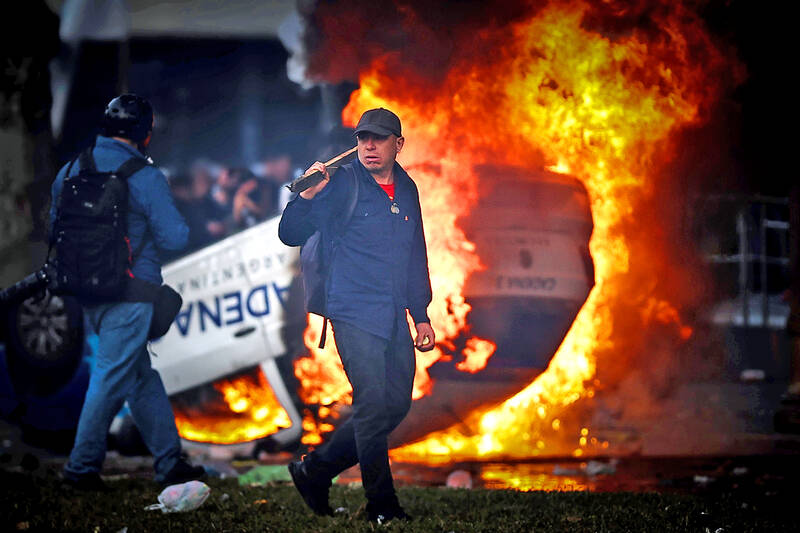Argentine President Javier Milei’s economic reform package yesterday won Senate approval after police and protesters violently clashed outside Congress.
Lawmakers debated a swath of liberalizing reforms proposed by the president, while security forces fired tear gas and water cannons at people rioting outside the day before.
Late on Wednesday, the package won approval “in general” in the Argentine Senate, an important step for Milei’s effort to get his flagship reforms across the finish line.

Photo: EPA-EFE
“For those Argentines who suffer, who wait, who do not want to see their children leave the country ... my vote is affirmative,” Argentine Vice President and Senate leader Victoria Villaruel said after breaking the 36-36 tie in the chamber.
The bill’s separate articles were addressed point by point and approved with modifications in a full vote early yesterday.
The measure now heads to the lower house for a final green light.
The Argentine presidency celebrated the “historic approval” of the economic deregulation law as the “most ambitious legislative reform of the last 40 years.”
Milei’s party is in the minority in both houses of Congress, which he has described as a “nest of rats.”
The Senate went on to discuss a parallel tax reform, which includes reinstating an income tax to tax salaries and pensions.
Scuffles broke out earlier when protesters tried to bypass a system of fences set up between them and Congress.
Officers used rubber bullets and pepper spray against the rioters, who responded by lobbing stones at the police.
Seven people, including five lawmakers among the protesters, were treated at hospital after being pepper sprayed, the Argentine Ministry of Health said.
Dozens of others received medical attention at the scene.
Later, as night fell, thick blocks of shield-bearing officers and others on motorbikes pushed back the protesters, who overturned two cars — one of which belonged to a local media organization — and set them on fire.
At least 10 people were arrested and nine police officers were injured, a spokesman for the Argentine Ministry of Security told reporters.
In one scene, a lone protester stood and held his hand in military salute as he faced a phalanx of police in riot gear, with smoke from cannisters swirling around him.
The office of the president on X denounced “the terrorist groups that with sticks, stones and even grenades, tried to perpetrate a coup d’etat.”
Inside Congress, senators were debating into the night and early the next morning Milei’s reform bill, which was approved with major changes by the Argentine Chamber of Deputies in April.
The whittled-down bill has 238 articles, including declaring a one-year state of economic emergency, allowing Milei to disband federal agencies and privatizing about a dozen public companies including state-owned carrier Aerolineas Argentina.
Others deal with reducing access to minimum retirement allowances and weakening labor protections.
The provisions also envision tax, customs and foreign exchange incentives to encourage investment in the country wracked by economic crisis.

NATIONAL SECURITY: The Chinese influencer shared multiple videos on social media in which she claimed Taiwan is a part of China and supported its annexation Freedom of speech does not allow comments by Chinese residents in Taiwan that compromise national security or social stability, the nation’s top officials said yesterday, after the National Immigration Agency (NIA) revoked the residency permit of a Chinese influencer who published videos advocating China annexing Taiwan by force. Taiwan welcomes all foreigners to settle here and make families so long as they “love the land and people of Taiwan,” Premier Cho Jung-tai (卓榮泰) told lawmakers during a plenary session at the Legislative Yuan in Taipei. The public power of the government must be asserted when necessary and the Ministry of

CROSSED A LINE: While entertainers working in China have made pro-China statements before, this time it seriously affected the nation’s security and interests, a source said The Mainland Affairs Council (MAC) late on Saturday night condemned the comments of Taiwanese entertainers who reposted Chinese statements denigrating Taiwan’s sovereignty. The nation’s cross-strait affairs authority issued the statement after several Taiwanese entertainers, including Patty Hou (侯佩岑), Ouyang Nana (歐陽娜娜) and Michelle Chen (陳妍希), on Friday and Saturday shared on their respective Sina Weibo (微博) accounts a post by state broadcaster China Central Television. The post showed an image of a map of Taiwan along with the five stars of the Chinese flag, and the message: “Taiwan is never a country. It never was and never will be.” The post followed remarks

Proposed amendments would forbid the use of all personal electronic devices during school hours in high schools and below, starting from the next school year in August, the Ministry of Education said on Monday. The Regulations on the Use of Mobile Devices at Educational Facilities up to High Schools (高級中等以下學校校園行動載具使用原則) state that mobile devices — defined as mobile phones, laptops, tablets, smartwatches or other wearables — should be turned off at school. The changes would stipulate that use of such devices during class is forbidden, and the devices should be handed to a teacher or the school for safekeeping. The amendments also say

CONSISTENT COMMITMENT: The American Institute in Taiwan director said that the US would expand investment and trade relationships to make both nations more prosperous The US would not abandon its commitment to Taiwan, and would make Taiwan safer, stronger and more prosperous, American Institute in Taiwan Director Raymond Greene said. “The US’ commitment to Taiwan has been consistent over many administrations and over many years, and we will not abandon our commitment to Taiwan, including our opposition to any attempt to use force or coercion to change Taiwan’s status,” he said in an exclusive interview with the Liberty Times (the sister newspaper of the Taipei Times) on Friday last week, which was published in the Chinese-language newspaper yesterday. The US would double down on its efforts